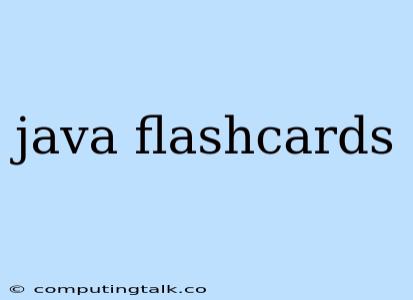Java is a powerful and versatile programming language that is widely used in various industries. It is a great choice for developing applications, games, and websites. However, mastering Java can be challenging due to its vast syntax and complex concepts. To effectively learn and retain Java concepts, utilizing flashcards is an excellent method.
What are Java Flashcards?
Java flashcards are a study tool that helps you memorize key Java concepts, syntax, and keywords. They typically consist of a question on one side and the answer on the other. This format allows you to test your knowledge and identify areas that need further review.
Benefits of Using Java Flashcards
Using Java flashcards offers numerous benefits for students and developers:
- Active Recall: Flashcards encourage active recall, where you actively retrieve information from your memory, rather than passively reading through notes. This process strengthens your understanding and improves retention.
- Focused Learning: Flashcards allow you to focus on specific concepts or areas that you need to improve upon. This targeted approach helps you prioritize your study time and avoid getting overwhelmed.
- Mobile Learning: Flashcards are portable and can be used anywhere, anytime. You can study on the go, during breaks, or even while waiting in line.
- Spaced Repetition: Flashcards support spaced repetition, a technique that involves reviewing information at increasing intervals. This method helps you retain information for longer periods.
- Personalized Learning: You can create custom flashcards tailored to your specific learning needs and weaknesses.
Creating Java Flashcards
There are several ways to create Java flashcards:
- Handwritten: You can create flashcards by hand using index cards or paper. This method is simple and allows for personalization.
- Online Tools: Numerous online platforms offer free and paid tools for creating digital flashcards. These tools provide features like image support, audio recordings, and shared decks.
- Software: You can also use software like Anki or Quizlet to create and manage flashcards. These programs often offer advanced features like spaced repetition algorithms and progress tracking.
Java Flashcard Content Ideas
Here are some ideas for Java flashcard content:
- Data Types: Include questions about different data types in Java, such as int, double, boolean, and char.
- Operators: Test your knowledge of arithmetic, relational, logical, and bitwise operators.
- Control Flow: Include flashcards on if-else statements, loops (for, while, do-while), and switch statements.
- Classes and Objects: Create flashcards on class definitions, object creation, methods, constructors, and inheritance.
- Arrays: Test your understanding of array declaration, initialization, access, and manipulation.
- Strings: Include flashcards on string manipulation, methods, and comparisons.
- Collections: Test your knowledge of different collection frameworks like ArrayList, HashMap, and HashSet.
- Exceptions: Create flashcards on exception handling, try-catch blocks, and exception types.
- Multithreading: Include flashcards on thread creation, synchronization, and communication.
Using Java Flashcards Effectively
- Start Small: Begin with a small number of flashcards and gradually increase the number as you become more comfortable.
- Regular Review: Review your flashcards regularly, even if you think you know the answers. Spaced repetition helps solidify your understanding.
- Mix and Match: Don't just focus on one topic at a time. Mix flashcards from different areas to create a more comprehensive review.
- Active Learning: Don't just passively read the flashcards. Try to explain the concepts to yourself or a friend.
- Use Different Methods: Experiment with different learning methods, such as writing down the answers or explaining the concepts in your own words.
- Track Your Progress: Keep track of your progress by marking the flashcards you've mastered or by using online tools that provide analytics.
Conclusion
Java flashcards are a powerful study tool that can help you effectively learn and retain Java concepts. By creating and using flashcards regularly, you can improve your understanding, build a strong foundation, and prepare for exams or interviews. Remember to keep your flashcards updated with new concepts as you progress in your Java journey.
